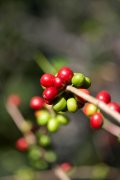Saeco coffee machine can not put coffee powder coffee roasting, red wine treatment
Author: Fisher
Link: http://www.zhihu.com/question/28538203/answer/59123683
Source: Zhihu
The copyright belongs to the author. Commercial reprint please contact the author for authorization, non-commercial reprint please indicate the source.
After SaSa won the WBC championship, the variety of Remy Sultan, as well as the red wine treatment it uses, has become a hot discussion in the industry.
In the process of coffee fruit to raw coffee bean treatment, there will be more or less "fermentation", whether it is washing treatment, honey treatment, or sun treatment will undergo this chemical change process. Different substances involved in fermentation (coffee peel, coffee pulp, coffee pectin, species of bacteria, distribution of bacteria), different fermentation environment (water and water, oxygen and oxygen, PH environment, etc.), different drying process (container material, natural sun, drying equipment, turning times, etc.), resulting in different post-treatment flavor and taste.
Lao Zhang (Jeremy Zhang, Zhang Yinzhe) coffee beans used in the WBC World Competition, and the creator series cooperated with 90 +, have a sealing "warm water blanching" step in the pre-treatment, which is also designed to control the degree of fermentation.
If the above factors related to fermentation can be controlled, the treatment process can be scientifically controlled according to the characteristics of coffee beans and their own needs. In his book long live Taiwan Coffee, teacher Han Huaizhong recorded some attempts and breakthroughs in the post-processing of Taiwan coffee in the past two years. I have asked Mr. Han about the advantages and disadvantages of the two methods of "changing varieties" and "doing later". (of course, if it is a good variety plus good treatment is the most ideal state.) compared with the two, post-processing is cheaper, less risky and more effective.
Let's go back to the subject of wine handling. SaSa selected Rume Sudan from Las Nubes, Columbia, referred to the fermentation process of wine treatment, put the coffee fruit in a sealed metal container for anaerobic fermentation, and purposefully controlled the PH value in the fermentation process, the type and number of bacteria involved in the fermentation and other factors to create the champion flavor in the cup. If this process of controlling fermentation is called "red wine treatment", then the winey treatment in Panama and Guatemala in the last two years should be called "red wine flavor treatment".
The origin of the "red wine treatment" comes from its treatment process, and the "red wine flavor treatment" is named from its treatment results-full alcohol thickness, red wine fermentation flavor, low acidity and excellent sweetness. (The result is a more full-bodied, slightly winey, sweeter coffee with less acidity.)
So what is the process of "red wine flavor treatment"? In fact, the treatment of Winey is strictly similar to that of solarization, or "efficient solarization". Pick the fully ripe coffee fruit and use industrial wind equipment to increase the air flow in the coffee bean drying space and accelerate the fruit drying.

Important Notice :
前街咖啡 FrontStreet Coffee has moved to new addredd:
FrontStreet Coffee Address: 315,Donghua East Road,GuangZhou
Tel:020 38364473
- Prev

Spaghetti spaghetti with beans, latte, cappuccino, mocha
This kind of mixed beans is also used in our own store. I've been using it since I opened the store for about half a year. We used Brazilian and Colombian beans to match, using medium-to-deep baking. When discussing this mixed bean, we hope to use American beans as the main body to enhance the nut, sweet taste and minimize the bitter taste. this
- Next

Bourbon Coffee Coffee Culture in Europe and America
Bourbon Coffee (French: Caf Bourbon) is a kind of coffee produced by growing coffee trees in Arabica coffee bourbon. Bourbon coffee was originally grown in Reunion, which was also known as le Bourbon Island before 1789. It was later occupied by France to connect with the African continent and Latin America, and is now the two most popular Arabica in the world.
Related
- Guji coffee producing area of Guji, Ethiopia: Humbela, Shakiso, Wulaga
- What is the most expensive variety of Qiloso in BOP multi-variety group?
- How to store the coffee beans bought home?
- Why are Yemeni coffee beans so rare now?
- Ethiopian Sidamo all Red Fruit Sun Sun Santa Vini Coffee beans
- SOE is mostly sour? What does it mean? Is it a single bean? what's the difference between it and Italian blending?
- Is Italian coffee beans suitable for making hand-brewed coffee?
- How to choose coffee beans when making cold coffee? What kind of coffee beans are suitable for making cold coffee?
- Just entered the pit to make coffee, what kind of coffee beans should be chosen?
- Can only Japan buy real Blue Mountain Coffee? What are authentic Jamaican Blue Mountain coffee beans?

